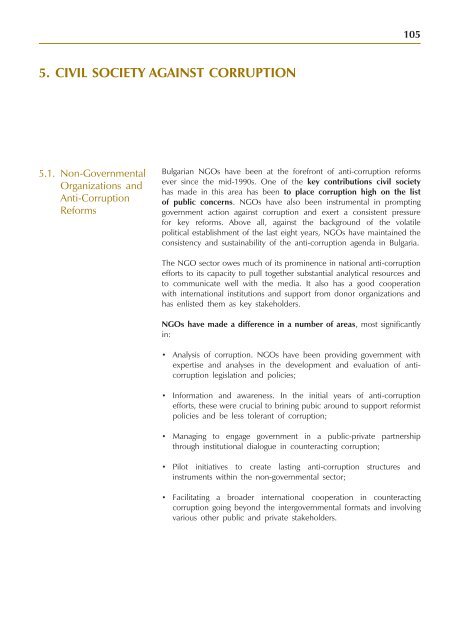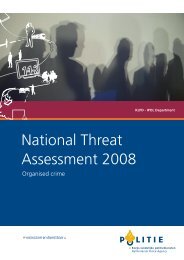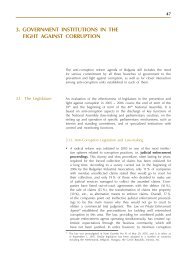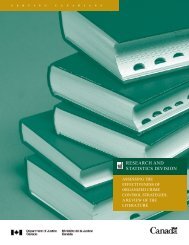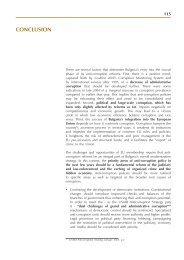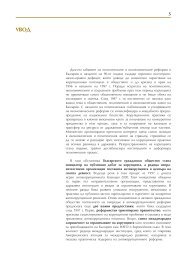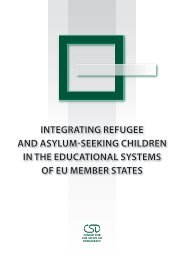5. Civil Society against Corruption (PDF, 293 kb)
5. Civil Society against Corruption (PDF, 293 kb)
5. Civil Society against Corruption (PDF, 293 kb)
You also want an ePaper? Increase the reach of your titles
YUMPU automatically turns print PDFs into web optimized ePapers that Google loves.
105<br />
<strong>5.</strong> CIVIL SOCIETY AGAINST CORRUPTION<br />
<strong>5.</strong>1. Non-Governmental<br />
Organizations and<br />
Anti-<strong>Corruption</strong><br />
Reforms<br />
Bulgarian NGOs have been at the forefront of anti-corruption reforms<br />
ever since the mid-1990s. One of the key contributions civil society<br />
has made in this area has been to place corruption high on the list<br />
of public concerns. NGOs have also been instrumental in prompting<br />
government action <strong>against</strong> corruption and exert a consistent pressure<br />
for key reforms. Above all, <strong>against</strong> the background of the volatile<br />
political establishment of the last eight years, NGOs have maintained the<br />
consistency and sustainability of the anti-corruption agenda in Bulgaria.<br />
The NGO sector owes much of its prominence in national anti-corruption<br />
efforts to its capacity to pull together substantial analytical resources and<br />
to communicate well with the media. It also has a good cooperation<br />
with international institutions and support from donor organizations and<br />
has enlisted them as key stakeholders.<br />
NGOs have made a difference in a number of areas, most significantly<br />
in:<br />
• Analysis of corruption. NGOs have been providing government with<br />
expertise and analyses in the development and evaluation of anticorruption<br />
legislation and policies;<br />
• Information and awareness. In the initial years of anti-corruption<br />
efforts, these were crucial to brining pubic around to support reformist<br />
policies and be less tolerant of corruption;<br />
• Managing to engage government in a public-private partnership<br />
through institutional dialogue in counteracting corruption;<br />
• Pilot initiatives to create lasting anti-corruption structures and<br />
instruments within the non-governmental sector;<br />
• Facilitating a broader international cooperation in counteracting<br />
corruption going beyond the intergovernmental formats and involving<br />
various other public and private stakeholders.
106 ANTI-CORRUPTION REFORMS IN BULGARIA<br />
Open Government Initiative Project<br />
The Open Government Initiative (OGI) project is implemented in<br />
Bulgaria by DPK Consulting with funding from the United States<br />
Agency for International Development (USAID) and covers activities<br />
related to institutional capacity building, prevention of corruption,<br />
enhancing the transparency and accountability, and reinforcing the<br />
rule of law, particularly in the areas of public sector auditing and<br />
public procurement.<br />
OGI supports the efforts of civil society to enlist broader public<br />
participation in the fight <strong>against</strong> corruption and encourages<br />
cooperation with state institutions, the media, and the private<br />
sector. Since the outset of the project, there have been three calls<br />
for proposals for anti-corruption projects with fourteen projects of<br />
civic organizations implemented in 2003 and 2004.<br />
<strong>5.</strong>1.1. Public-Private Partnership<br />
Public-private partnerships were not the most obvious choice of going<br />
about anti-corruption reforms in 1997, and not only in Bulgaria. Bulgarian<br />
non-governmental organizations could be credited for managing to engage<br />
government in an area that was not only sensitive but also required<br />
considerable commitment of will and resources. Eight years later it<br />
could be safely said that cooperation between the civil sector and<br />
government is as a major prerequisite for successful anti-corruption<br />
reforms. At the same time, the interaction between state and civic<br />
organizations involves a number of inherent strains.<br />
Anti-corruption initiatives and efforts launched by NGOs in Bulgaria<br />
continued to face an essentially ambivalent attitude on the part of the<br />
state. Since corruption came on the agenda, governments have wavered<br />
between the aspiration to identify with the values of transparency<br />
and integrity, on the one hand, and the reluctance to publicly<br />
acknowledge corruption, particularly at its higher ranks, on the other.<br />
The inconsistent anti-corruption efforts and the discrepancy between<br />
political rhetoric and actual policies contributed to the alienation between<br />
government and the public. Among other things, this has enhanced the<br />
need for greater role of NGOs in anti-corruption.<br />
Attitudes in parliament towards corruption were equally marked by<br />
ambivalence as the parliamentary bodies, trusted with tackling it, could<br />
not incorporate anti-corruption priorities in the agenda setting of the<br />
legislature. This adversely affected the anti-corruption cooperation<br />
between governing majorities and non-governmental organizations.<br />
Another factor undermining public-private partnerships has been<br />
partisanship. Political parties and politicians frequently tried to present<br />
a better public image by associating with NGO anti-corruption efforts.
CIVIL SOCIETY AGAINST CORRUPTION 107<br />
This has hampered both the effectiveness of NGOs and the credit they<br />
take for their effort.<br />
Public-private partnership at the local level also faced certain problems.<br />
Many pre-election commitments of the local authorities to participate in<br />
joint anti-corruption initiatives with the civic sector were not met at all<br />
or failed to lead to the creation of permanent mechanisms of publicprivate<br />
partnership or to any tangible anti-corruption results.<br />
Despite these challenges public-private partnerships have become<br />
the most effective mechanism through which anti-corruption reforms<br />
were implemented.<br />
These partnerships have come in numerous forms. NGO experts have<br />
played important role in the discussion and assessment of draft anticorruption<br />
legislation. A case in point is the elaboration by Coalition<br />
2000 of the draft ombudsman law, its cooperation with the Customs<br />
Agency and the Ministry of Interior in identifying measures <strong>against</strong><br />
smuggling and related corruption, as well as with the Ministry of Labor<br />
and Social Policy and the Ministry of the Economy in developing<br />
extensive measures to restrict unregistered employment and reduce the<br />
regulatory burden of the state.<br />
Monitoring the integrity of public services of high corruption risk<br />
is another area where Coalition 2000 and a number of watchdog<br />
organizations have been active. NGOs have received and investigated<br />
reported cases of corruption and, in partnership with state institutions<br />
and the media, helped put in place the conditions for improved public<br />
accountability and transparency and for curbing corrupt practices at the<br />
various levels of government. A local level anti-corruption network was<br />
also established on the initiative of Coalition 2000 in partnership with<br />
non-governmental organizations to monitor corruption risk zones in the<br />
municipal administration.<br />
<strong>Civil</strong> society organizations outside the capital city Sofia are increasingly<br />
active. This is crucial as policies undertaken by the government need to<br />
be supplemented local level effort engaging citizens and thus ensuring<br />
that policies keep their relevance and government receives feedback.<br />
For example, since 1997 Coalition 2000 and other NGOs have initiated<br />
the establishment of local institutions of the ombudsman type (public<br />
mediators). Even before an adequate legal framework was put in place,<br />
similar institutions were set up in a number of municipalities (Sofia,<br />
Veliko Turnovo, Razgrad, Zavet, and others) and started operating upon<br />
the initiative of civil society in cooperation with the local authorities.<br />
It should also be noted that non-governmental organizations themselves<br />
continue to be vulnerable to corruption. Enhanced accountability is<br />
needed for two main reasons: the majority of NGO funding in Bulgaria<br />
comes from foreign public sources; there could be justified public<br />
mistrust of those non-governmental organizations which thrive on political<br />
protection and privileges.
108 ANTI-CORRUPTION REFORMS IN BULGARIA<br />
<strong>5.</strong>1.2. Coalition 2000<br />
Coalition 2000 is an initiative of Bulgarian non-governmental organizations<br />
which brings together the efforts of civil society and state institutions.<br />
The efforts of Coalition 2000 and its partners have shaped the overall<br />
civil society involvement in combating corruption since 1997. Although<br />
initially seen as ambitious, all of Coalition 2000’s initial goals have been<br />
achieved:<br />
• A no-go area for public discussion some years ago, anti-corruption is<br />
now of mainstream concern in the policy agenda. As a result mostly<br />
of Coalition 2000’s monitoring system, corruption was acknowledged<br />
by political elites and recognized as a problem by the general public.<br />
The Coalition has shown not only that corruption can be measured<br />
but that measurement is crucial in its successful combat. The<br />
regular publication of data on the actual prevalence of corruption<br />
in society has given the public an instrument of advocacy and<br />
pressure, and has allowed government to better tailor its policies.<br />
Coalition 2000’s monitoring system has been included as part of the<br />
UN Anti-<strong>Corruption</strong> Tool Kit and is routinely referred to by various<br />
international institutions, including the European Commission, World<br />
Bank, IMF, UNDP and others.<br />
• By informing the policy process, Coalition 2000’s quarterly indexes on<br />
the spread of corruption have made a difference in a number of areas,<br />
lately on the hidden economy. Data on the gray economy prompted<br />
the government to introduce changes to employment legislation. The<br />
Coalition’s subsequent monitoring revealed a 25% drop in the share<br />
of the hidden economy in labor relations while highlighting remaining<br />
concerns in other areas. Thus, Coalition 2000’s watchdog mechanism<br />
has served both as an early warning and as a policy effectiveness<br />
feedback instrument.<br />
• Anti-corruption is now an avowedly strategic concern for government,<br />
and policy in this area is sought to be a comprehensive mix of<br />
prevention and enforcement. Bulgaria has aligned its laws with the<br />
best international standards and is actively contributing to their further<br />
development. The adoption of the Coalition 2000 Action Plan by a<br />
broad national consensus at the 1998 Policy Forum has helped structure<br />
the entire policy and institutional anti-corruption environment in<br />
the country by outlining the key challenges and solutions in the field<br />
of government, media and civil society, business and international<br />
cooperation. In an ultimate acknowledgment of the role of Coalition<br />
2000 in this process, the government based the better part of its<br />
2001 Anti-<strong>Corruption</strong> Strategy on the Action Plan of the Coalition.<br />
Coalition experts made valuable contributions to the drawing of the<br />
strategy. The document highlights the need to “build mechanisms<br />
and effective partnership practices between state institutions, nongovernmental<br />
organizations and privately-owned media in areas such<br />
as democratic control over the administration’s activities, civil rights<br />
protection, independent oversight and anti-corruption awareness and
CIVIL SOCIETY AGAINST CORRUPTION 109<br />
advocacy campaigns”. The strategy acknowledges the important role<br />
of Coalition 2000 and Transparency International-Bulgaria.<br />
• The anti-corruption experience of the Coalition has a growing<br />
international recognition. Regional anti-corruption projects such as<br />
Southeast European Legal Development Initiative (SELDI) have drawn<br />
on the public-private model of Coalition 2000 in bringing together<br />
NGOs from a number of countries in the region.<br />
<strong>5.</strong>2. The Role of Media<br />
in Anti-<strong>Corruption</strong><br />
The media play a very important role in shaping popular perceptions<br />
and attitudes to corruption. As shown by the Coalition 2000 <strong>Corruption</strong><br />
Monitoring System, roughly half of the adult Bulgarian citizens get<br />
information about instances of corruption from broadcast and print<br />
media.<br />
CHART 31. AVERAGE MONTHLY NUMBER OF CORRUPTION-RELATED ITEMS<br />
IN THE MEDIA<br />
June ‘04<br />
723<br />
May ‘04<br />
739<br />
April ‘04<br />
720<br />
March ‘04<br />
831<br />
February ‘04<br />
January ‘04<br />
599<br />
December ‘03<br />
691<br />
November ‘03<br />
679<br />
October ‘03<br />
September ‘03<br />
740<br />
August ‘03<br />
501<br />
July ‘03<br />
700<br />
June ‘03<br />
782<br />
961<br />
1 050<br />
The regular media monitoring<br />
conducted by Coalition 2000 9<br />
indicates that both print and<br />
electronic media devote increased<br />
attention to corruption.<br />
While with the emergence<br />
of anti-corruption initiatives in<br />
1998 the average monthly number<br />
of corruption-related items<br />
was about 150-200, in 2002 it<br />
reached 400 pieces, and by<br />
2004 it had risen to more than<br />
700 on average, regardless of<br />
whether the respective period<br />
was marked by a major corruption-related<br />
news story or<br />
public scandal.<br />
May ‘03<br />
802<br />
April ‘03<br />
656<br />
March ‘03<br />
410<br />
February ‘03<br />
682<br />
January ‘03<br />
599<br />
December ‘02<br />
November ‘02<br />
October ‘02<br />
555<br />
583<br />
617<br />
September ‘02<br />
306<br />
August ‘02<br />
July ‘02<br />
443<br />
494<br />
June ‘02<br />
334<br />
0 200 400 600 800 1 000 1 200<br />
Source: Media Monitoring by Coalition 2000<br />
9<br />
The monitoring covered 32 national<br />
media, of which 10 dailies, 8 weeklies,<br />
7 internet media, all 3 national<br />
television stations, and 4 radio stations.<br />
Forty-eight weekly and 12 monthly<br />
reports have been prepared, as well<br />
as 7 topical analyses on some of the<br />
corruption-related stories that received<br />
most extensive media coverage (such<br />
as corruption in higher education, the<br />
Sofiyski Imoti affair, the selling of lowprice<br />
flats to government officials, the<br />
scandals at the National Protection<br />
Service, the grain siphoned off from<br />
the strategic grain reserve, etc.).
110 ANTI-CORRUPTION REFORMS IN BULGARIA<br />
In the late 1990s, corruption was typically discussed by the media<br />
in general and non-personified terms. Now, increasingly corruption<br />
coverage deals with specific cases. Print media, which tended to resort<br />
to sensationalism, are gradually adopting a much more professional<br />
attitude in the investigation of this issue. Already there are reporters who<br />
write unbiased pieces on both concrete cases of corruption and on the<br />
underlying causes of corruption.<br />
CHART 32. DEGREE OF CONCRETENESS OF CORRUPTION-RELATED ITEMS IN<br />
THE MEDIA (AUGUST 2004)<br />
632<br />
<strong>Corruption</strong> as a phenomenon in most general terms<br />
<strong>Corruption</strong> in a particular public sphere<br />
<strong>Corruption</strong> in a particular state authority, public organization, professional group<br />
Specific data on corruption<br />
Specific case of corruption<br />
Source: Media Monitoring by Coalition 2000<br />
103<br />
25<br />
131<br />
246<br />
One notable development has<br />
been the shift of focus from<br />
petty to high-level corruption<br />
without this being used<br />
for party political confrontation<br />
(Table 18). If soon after 1997<br />
the topic of corruption was<br />
usually brought up in the context<br />
of political antagonism, in<br />
recent years the public debate<br />
on corruption has shifted away<br />
from partisanship and more towards<br />
a broader civic agenda.<br />
The subject of anti-corruption<br />
is increasingly treated in the<br />
context of the need to establish<br />
a political culture of transparency<br />
and accountability. The<br />
perfunctory partisan discourse<br />
is gradually being replaced by<br />
an understanding of the underlying<br />
causes of corruption.<br />
Further, there has been a relative increase in the number of success stories<br />
on anti-corruption measures and a considerable increase in the average<br />
number of items reporting successful punishment of corruption.<br />
Political corruption has increasingly been spotlighted by the media and<br />
journalistic interest in it has been sustained by disclosures of corrupt<br />
abuse of power, but also by the overall process of adoption of modern<br />
standards of transparency in the context of the country’s European<br />
integration.<br />
Undoubtedly, the media rely on civic organizations and initiatives for<br />
assessments of the scope of corruption, as well as for information on<br />
the related perceptions and attitudes of Bulgarians. The level of trust<br />
achieved between the media and non-governmental organizations in the<br />
context of anti-corruption critique of governments is an important step<br />
toward reinforcing civil society.
CIVIL SOCIETY AGAINST CORRUPTION 111<br />
TАBLE 18. DISTRIBUTION OF CORRUPTION-RELATED ITEMS BY<br />
TOPIC (OCTOBER 2004)<br />
Topics<br />
Anticorruption<br />
Measures<br />
Corrupt<br />
Practices<br />
Investigations,<br />
arrests<br />
Governance 15 157 -<br />
Cabinet 22 38 8<br />
Public administration 17 31 14<br />
Customs administration 4 40 5<br />
Army 1 6 -<br />
Local government 2 26 5<br />
Statements by ministers, deputy ministers, and other public figures 25 38 -<br />
Political Parties 8 45 -<br />
Legislature - - -<br />
Laws and draft laws 11 9 -<br />
Parliament - 2 -<br />
Members of Parliament 1 2 -<br />
Statements by MPs and other public figures 7 17 -<br />
Judiciary and Police 1 8 1<br />
Courts 1 43 -<br />
Prosecution 2 3 1<br />
Investigation 2 - 5<br />
Police 25 20 34<br />
Statements by representatives of the judiciary, the police and<br />
commentaries<br />
4 10 -<br />
<strong>Society</strong> - 1 -<br />
Healthcare 4 30 19<br />
Education 14 10 -<br />
Other 1 6 -<br />
Economy - 11 -<br />
Public Procurement 1 4 -<br />
EU Funds 1 3 -<br />
Privatization - 3 -<br />
Business 2 13 1<br />
Non-governmental and international organizations 1 - 10<br />
Bulgarian NGOs 7 2 -<br />
International organizations 35 5 -<br />
Media 7 21 1<br />
Total 221 604 102<br />
Source: Media Monitoring by Coalition 2000
112 ANTI-CORRUPTION REFORMS IN BULGARIA<br />
CHART 33. DISTRIBUTION OF CORRUPTION-RELATED ITEMS BY GENRE<br />
800<br />
700<br />
600<br />
500<br />
400<br />
300<br />
200<br />
100<br />
0<br />
688<br />
Information<br />
147<br />
Interview<br />
Source: Media Monitoring by Coalition 2000<br />
265<br />
Analysis<br />
23 14<br />
Investigative<br />
report<br />
Editorial<br />
Investigative journalism is<br />
the most high-risk professional<br />
commitment as well as the<br />
costliest investment and serious<br />
media cannot afford to ignore<br />
it. It is still underused, though,<br />
since shortage of financial<br />
resources and a heavy reliance<br />
on advertising, typical of a most<br />
Bulgarian media, drive them to<br />
focus on more conventional<br />
reporting genres and general<br />
information. Investigative<br />
journalism is still viewed as a<br />
luxury that is not necessarily<br />
warranted and one that may,<br />
in the event of a clash of<br />
interests, affect the survival of<br />
the respective media.<br />
Journalistic disclosures still have a very low “life expectancy”. The blame<br />
is to be shared by the respective reporters/media and public authorities<br />
who for the most part still tend to ignore the investigative reports. On<br />
the other hand, there are also the stories aimed at discrediting particular<br />
public figures or organizations. Smear campaigns are part of the media<br />
landscape and tend to proliferate in periods of major political events,<br />
election times in particular. It is a professional test for journalism how<br />
susceptible the media are to this type of abuse of their public power,<br />
more often than not proving to be the turf of former and current<br />
officials in the security sector. One alarming tendency, however, is the<br />
tacit taboo in the professional community on publications concerning<br />
corruption in the media themselves.<br />
The media have undeniably managed to demonstrate that a wide<br />
range of dubious practices in Bulgarian society are in fact corruption.<br />
They have raised public sensitivity and encouraged intolerance to a<br />
broad spectrum of corrupt actions. They have also coined a matching<br />
discourse for the public to use in the debate on corruption.<br />
The media are now not simply reporting law enforcement action <strong>against</strong><br />
corruption but publish facts which need further investigation. In this,<br />
besides the usual methods reporters rely more on whistleblowers and<br />
on non-governmental organizations. There are already numerous good<br />
practices where the media, civic organizations, law-enforcement bodies,<br />
and the public administration form effective coalitions. They, however,<br />
rarely outlive the particular purpose of their formation.<br />
In the last few years certain pieces of legislation related to judicial and<br />
economic reform were highlighted by some print and broadcast media<br />
because of the corruption risks involved. This was a good example how<br />
the media can do valuable preventive work as well.
CIVIL SOCIETY AGAINST CORRUPTION 113<br />
Implementing professional and ethical journalistic codes is an important<br />
step towards enhancing media accountability. The fact that the code of<br />
ethics of journalists adopted in late 2004 was signed by major media<br />
provides some reason for hope. The code obliges the signatories to<br />
verify their sources and not to quote anonymous sources unless the<br />
information provided is of public importance; to differentiate information<br />
from commentary; to specially designate any paid advertisements and<br />
commercial messages, etc.<br />
<strong>5.</strong>3. Anti-<strong>Corruption</strong><br />
Education<br />
Education is arguably the most powerful instrument in shaping social<br />
attitudes. In acknowledging its role in anti-corruption, the National Strategy<br />
for Counteracting <strong>Corruption</strong> highlights the need to raise quality standards<br />
in secondary and higher education; to implement a policy aimed at<br />
restoring and reinforcing the authority and status of teachers; to develop<br />
and implement a national policy for monitoring and improving the<br />
quality of education through the system of staff recruitment in the<br />
various sectors, and to enhance the role of the national education<br />
system for the anti-corruption education and awareness of the nation.<br />
Aiming to leave a lasting impact in the field of anti-corruption,<br />
Coalition 2000 has also been successful in bringing Bulgaria’s young<br />
into the broader rule of law constituency. As a result of the Coalition<br />
work, there are now about 350 secondary schools in Bulgaria which<br />
have expressed interest in teaching anti-corruption as a part of the civic<br />
education program or as an optional subject.<br />
A working group put together by the Coalition with Ministry of Education<br />
representatives, teachers and NGOs is in the process of laying the<br />
long term framework for anti-corruption education by elaborating a<br />
policy Concept Paper on the formal introduction of anti-corruption<br />
education for the school year 2005/06. The working group, recognizing<br />
the need of teaching materials for teachers and students, promoted<br />
the preparation of resources such as training manuals, readers, course<br />
curriculum, online learning course. Upon the request of the Ministry of<br />
Education Coalition 2000’ training resources were distributed to schools<br />
and educational district administrations with the recommendation to be<br />
used as teaching tools.<br />
The Coalition has also prompted similar advancements in the universities<br />
where a number of optional anti-corruption courses were taught. For<br />
the first time anti-corruption was introduced in the curriculum of the<br />
Pedagogical Department at Sofia University as well as in the teaching<br />
program for 2004-2005 academic year at the Information and Qualification<br />
of Teachers Department, Sofia University.<br />
The Small Grants Program of Coalition 2000 was another important<br />
instrument to encourage anti-corruption education and to establish a<br />
nation wide network of NGOs working in this area. In different Bulgarian<br />
towns anti-corruption instruction at the secondary schools and onsite<br />
classes were piloted. Within these projects support was received from<br />
local and district authorities in introducing the “Open Doors” initiative
114 ANTI-CORRUPTION REFORMS IN BULGARIA<br />
(pupils’ visits to municipality offices, police, court, etc.) which was aimed<br />
at fostering a democratic culture, anticorruption values, etc. through<br />
enhancing the knowledge about the institutions, transparency and good<br />
governance, human and civil rights.<br />
However, efforts to teach anti-corruption to students could be jeopardized<br />
by graft in the very schools and universities. The latter, if they are to<br />
be successful in teaching anti-corruption schools and universities, need<br />
to promote integrity in their administration as well. In 2003, the data<br />
from the Coalition 2000 <strong>Corruption</strong> Monitoring System and other studies<br />
in the area of higher education challenged the assumption that this<br />
public service tended to be less affected by corruption. University faculty<br />
and administrative staff were ranked at one of the leading positions by<br />
amount of corruption pressure exerted. The proportion of those who<br />
have experienced corruption pressure from university teachers ranges<br />
between 12 and 21%, and as regards administrative staff, between 3<br />
and 12% of all who have had contacts with these groups. Besides the<br />
regular monitoring of corruption conducted by Coalition 2000, which<br />
provides information about the scope of the problem in the area<br />
of higher and secondary education, there have been a number of<br />
specific disclosures regarding bribes solicited at universities. A number<br />
of mechanisms have also been identified for corrupt practices – making<br />
students purchase textbooks and other works authored by particular<br />
faculty members; undue payment for administrative services and undue<br />
examination fees; issuing of false diplomas, etc.<br />
As in other areas of anti-corruption reforms, partnership between<br />
government and civil society would be crucial to tackle these<br />
challenges. These should involve both the Ministry of Education, the<br />
administration of state-run and private universities, parents’ associations,<br />
NGOs, regional educational inspectorates and other institutions. There<br />
have been already been some pilot efforts (eg electronic register of<br />
the regulatory framework of education and educational credits) which<br />
should be developed further.


